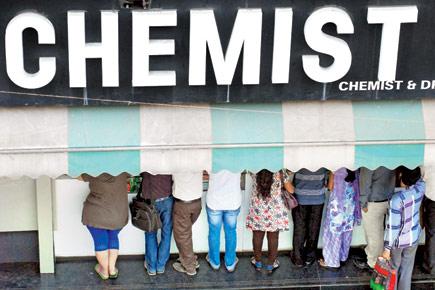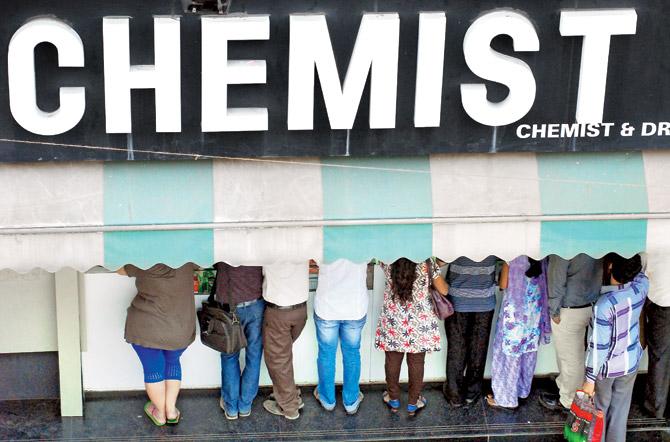Wholesalers stop placing orders with pharma companies, seeking clarity over losses they may incur due to doubling of tax slab under GST, set to be implemented from July 1


With the GST doubling the tax slab, from 6% to 12%, every stockist will have to bear a loss of 6%. PIC FOR REPRESENTATION
ADVERTISEMENT
It's time to stock up on some basic but important medicines — those for cardiac, orthopaedic and gynaecological issues, anti-diabetes (other than insulin), and blood pressure among others. Your nearest chemist may not have these in stock till the Goods and Services Tax (GST) is enforced from July 1, as wholesalers have stopped placing fresh orders with pharma companies, seeking clarity over the losses they may incur due to doubling of the tax slab under GST, which will impact 50,000 wholesalers and 8 lakh retailers all over India.
Waiting for clarity
President of the Pharmaceutical Wholesalers Association for Mumbai Dilip Mehta said, "The tax the government is intending to levy on medicines through GST from July 1 is double (12%) than what it was earlier through VAT (6%); this means stockists will have to bear a loss of 6%, as there is no clarity from either the government or pharma companies on this till date."
Also read: GST council lowers tax rates on cashews, insulin and school bags
"We have around 8 lakh retail chemist outlets and 50,000 wholesalers across India, who will directly have to bear the brunt of the new GST. We have already made our submissions before the competent authorities from both the pharma companies and the government but are yet to get any clarity on who will bear our losses," he added.
"Cancer and anti-malaria drugs, insulin for diabetes and vaccinations will be available, but drugs for cardiac, anti-diabetes, hypertension, orthopaedic, psychiatric and gynaecological problems may run out of stock."
When asked for how long will the shortage be there, Mehta said, "We stopped placing orders from June 15; once GST is implemented on July 1, we hope that the scene will be clearer. Only after that will we place orders with pharma companies; it will take a week to 10 days for the stock to arrive, and then, we will send it to the retailers, which may take another few days."
Also read: From gold to footwear, GST Council fixes rates
Another stockist, Mayur Pasad, a partner at Safe Life Corp in Mulund (West), said "On an average, every stockist has medicines worth over Rs 3-4 crore, which also means that once GST is introduced, each one of them is likely to incur a loss of R18-20 lakh. Moreover, the stockist will have to reduce the price for the retailer, while the MRP will remain the same for consumers until fresh stock with a reduced price tag arrives from the companies."
The domino effect
"Our industry's yearly turnover across India is above Rs 10,000 crore; so, this lack of clarity will result in a loss of hundreds of crores. And with no fresh orders being placed, pharma firms' production and sales will also get affected, resulting in derailment of the entire industry, ultimately hitting the patients," he added.
Nitin Maniar, secretary of Retail and Dispensing Chemist Association, Mumbai, said "The fact remains that like wholesalers, we retailers will also incur a loss of Rs 1-2 lakh per outlet (Mumbai has around 6,500 retail chemist outlets and around 500 wholesalers); on an average, every outlet may have inventories stacked for a minimum of two months, which it may try to clear at the earliest, and that's not a practical solution."
When asked how patients should cope with the shortage, Maniar added, "There is no need to panic, there may be shortage of certain fast-moving medicines (across segments), but doctors can prescribe alternatives. People should stock up on only those medicines that they absolutely can't do without."
Experts give their take
Professor Dr Pradeep Bhosale, director of arthritis and joint replacement surgery at Nanavati hospital, said, "Shortage of medicines will definitely have an impact on my planned surgeries, which can be postponed. My priority will be to handle emergency cases with the stocks available in the chemist outlet at the hospital."
"I feel that in the largest interest of patients' welfare, the government should take necessary remedial steps at the earliest to avoid any hardship to the common man," he added.
On the other hand, Dr Avinash Supe, dean of KEM hospital and director of medical education and major BMC hospitals, said that as the civic body has its own suppliers, its hospitals wouldn't get affected for want of medicines. However, he added, patients who have to get prescribed medicines from chemists will face issues.
Jaslok hospital physician Dr Rohan Sequeria said, "My patients have told me that chemists/stockists have started clearing their near-expiry stocks by giving consumers offers. Hence, I have already starting advising my patients to go for online pharmacies, where they can not only avail up to 20 per cent discount, but also get fresh stocks at their doorstep."
Taxing times
In a meeting yesterday, a delegation of various associations led by Chamber of Associations of Maharashtra Industry and Trade (CAMIT) met commissioner of sales tax, Maharashtra, Rajiv Jalota and requested that GST rates be revised for items under HSN code 8544, such as winding wires, coaxial cable and optical fibres, and those under HSN code 8536, such as electronic components (switches, connectors and relays), be taxed at a flat rate of 18% instead of 28%.
"Charging higher rates on end products is unjustified. The cable and wires industry is labour intensive and already reeling under tremendous pressure due to power sector woes, operating at less than 50% of its installed capacity. Hence, it won't be able to bare the differential tax burden of 10% on its finished goods," said Mohan Gurnani, CAMIT chairman.
"Different rates of GST for products will result in huge revenue leakage, and taxing the entire industry at 28% will shoot up the capital cost for industries as well as end users."
 Subscribe today by clicking the link and stay updated with the latest news!" Click here!
Subscribe today by clicking the link and stay updated with the latest news!" Click here!






